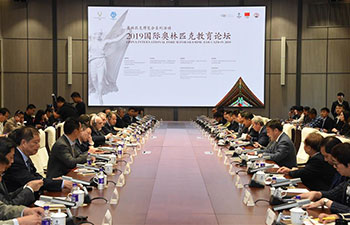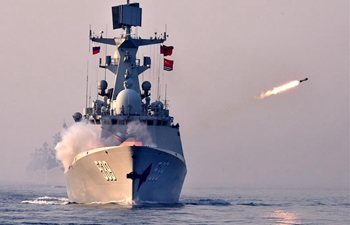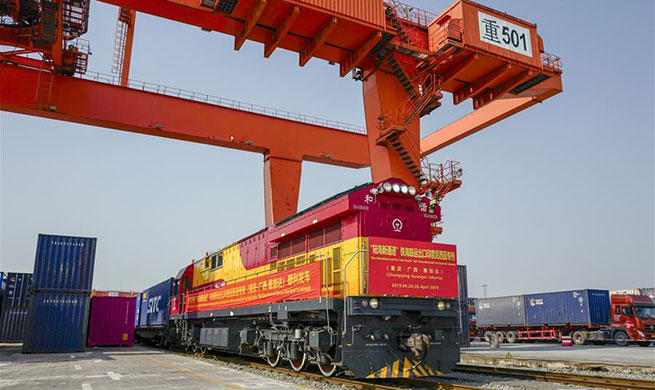ISTANBUL, May 5 (Xinhua) -- Turkey would observe the U.S. sanctions against Iran despite its sharp criticism of Washington's unilateral moves as Ankara would not risk yet another confrontation with its NATO ally amid economic woes, analysts told Xinhua.
"I expect Ankara to comply with the sanctions, because it cannot afford to oppose Washington on yet another front," said Hasan Koni, an international relations analyst.
Turkey is highly displeased with Washington's decision to reimpose sanctions on its neighbor which has traditionally been a significant supplier of oil and natural gas to Ankara.
"We do not accept unilateral sanctions and impositions about how we will establish relations with our neighbors," Turkish Foreign Minister Mevlut Cavusoglu said on April 22, the day Washington announced the end of exemptions granted to Turkey and other buyers of Iranian crude oil.
Given the bad shape the Turkish economy is in and all the other thorny issues between Ankara and Washington, it is difficult for Ankara to act otherwise, commented Koni who teaches at Istanbul Culture University.
Amid signs of recession, Turkey needs roughly as much as 200 billion U.S. dollars in 2019, nearly 175 billion dollars of which is short-term debt, to run its economy.
"I don't think Turkey could risk violating the U.S. sanctions on Iran," observed Celalettin Yavuz, a security and foreign policy analyst with Istanbul Ayvansaray University.
"In case Turkey wouldn't observe the sanctions, the economy would seriously suffer as the country would then be directly targeted by the U.S," he said.
Washington already threatened last month to economically punish Ankara if it would not scrap the deal over the Russian S-400 defense systems.
Turkey suffered economically last summer, with its currency devalued by as much as 30 percent, after the U.S. imposed sanctions on its ally amid dispute over an American pastor.
One of Turkey's state-owned banks, Halkbank, is facing hefty fine by Washington for alleged violations of previous U.S. sanctions against Iran between 2012 and 2015.
In 2018, a U.S. court found Hakan Atilla, the deputy general manager of the bank, guilty of violating the Iranian sanctions while Turkey said the trial was politically motivated.
The U.S. should review its decision on the sanctions, Cavusoglu said on May 2, the day the waivers granted to Turkey and others ended.
"It does not look possible for us to diversify the sources of the imported oil within a short time," the minister said.
Ankara-Washington ties are already rather strained due to, among others, Ankara's insistence on buying S-400 systems and Washington's military support to the Kurdish militia in Syria seen by Turkey as a terror group.
"Ankara has kept signaling that it would not observe the sanctions, but its oil imports from Iran have significantly dropped since last year," said Necdet Pamir, the energy director of Sigma Turkey, an Ankara-based think tank.
Iranian oil now makes up around 15 percent of Turkish oil imports while the rate was roughly 45 percent in 2017, noted Pamir.
Given the current situation facing the Turkish economy and the other problems Turkey has with the U.S., it looks difficult for Ankara to go against the U.S. policy, commented Pamir.
After unilaterally dropping in May last year out of a landmark nuclear deal with Tehran upon Iranian rejection of a renegotiation over the deal, Washington reintroduced sanctions last November on Iran's energy, banking, shipping and ship building industries.
Ankara and Tehran have been working to put in place an alternative non-dollar payment mechanism in bilateral trade, like the one the EU and Iran have forged to circumvent the U.S. sanctions.
Turkey should see what the EU and China are doing and seek to act in coordination with them, argued Yavuz.
Using local currencies in bilateral trade with Iran is far from being an option for the moment, Minister Cavusoglu said on Thursday, but he added that he had taken up some issues regarding bartering goods with his Iranian counterpart Mohammad Javad Zarif.
The analysts expect Turkey to make up for the loss in Iranian oil by increasing imports mainly from Iraq and Russia, Turkey's two other leading oil suppliers.
Since last year, Turkey's oil imports from Iraq have risen to around 30 percent of the total imports, said Pamir.
Cavusoglu's visit to Iraq at the end of April may have mainly focused on buying more oil from the country, Koni said.
Observing the Iranian sanctions will negatively affect the Turkish economy as the costs of oil import would increase, the analysts concluded.
















